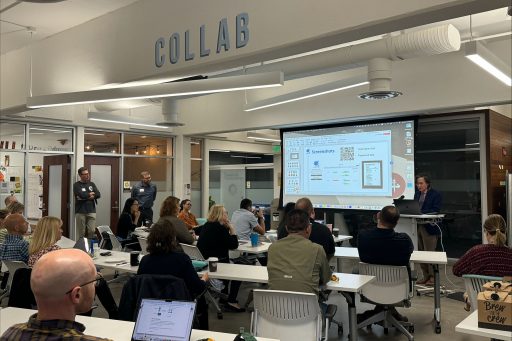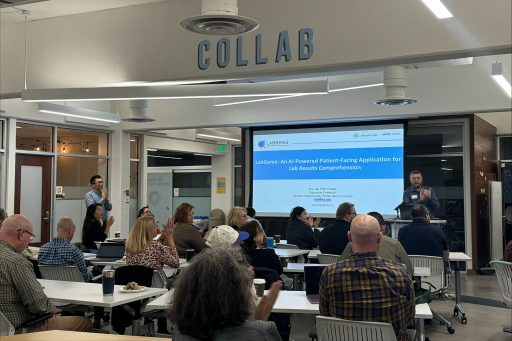Florida State University is helping faculty members learn how to best navigate academic innovation and the pertinent topic of artificial intelligence (AI) with a new program hosted by FSU’s Innovation Hub.
Sponsored by the Office of the Provost, Faculty Innovator Coffee Chats are offered every other Wednesday and provide an opportunity for faculty and staff from across campus to share insights and discuss opportunities surrounding academic innovation.
“I think AI is the next great technology challenge for universities, and we need to utilize it as a tool,” said Jim Clark, provost and executive vice president for Academic Affairs. “It’s crucial to harness the collective wisdom of our faculty to explore its potential. Testing AI and building a community of expertise at Florida State University is essential, rather than imposing it from the top down.”

For the fall 2024 semester, the informal chats have been centered around the use of generative AI in various disciplines, with FSU faculty members sharing how they are using these kinds of tools in their research and teaching. Generative AI is a form of artificial intelligence that can generate new content, such as text or art, and has implications and uses in all areas of academia.
The coffee chats are held in FSU’s Innovation Hub, a collaborative workspace that provides students and faculty unique opportunities to explore creative and innovative endeavors. The Hub supports faculty in teaching and research by providing resources, expertise and a community focused on the future of education.
“We like to say that innovation lies at the crossroads of disciplines,” said Ken Baldauf, founding director of the Innovation Hub. “We get so entrenched in our own work that it’s sometimes hard to see it from an outside perspective. When you talk to a professor from another department or college about what you’re doing in a completely different field, you can see how they might apply it to their own work. I think the interdisciplinary aspect of the Innovation Hub is the most important thing that happens here.”
The aim is for Faculty Innovator Coffee Chats to foster a community where faculty members can share innovative practices in their research and teaching. The sessions involve a brief presentation by a faculty member, followed by a structured conversation on the topic.
“Innovation happens at those boundaries, at the liminal edges, and by talking to people outside of your usual field of study.”
– Paul Marty, assistant vice provost for academic innovation
The most recent session focused on generative AI and medicine, with a presentation by School of Information professors Zhe He and Mia Lustria. He and Lustria have been working on research focused on incorporating AI into health care in various ways, such as their LabGenie project aimed at helping patients better understand the results of medical lab health tests. Session topics have also included ethics and art and academic integrity, with more planned for the upcoming fall and spring semesters.
As technology and innovation continue to play an increasingly important role in many aspects of today’s world, FSU continues to prioritize preparing faculty, staff and students to be successful and proficient in the latest technological developments.
Paul Marty, FSU’s first associate vice provost for academic innovation, is spearheading the university’s efforts to integrate new ideas into educational practices and help shape interdisciplinary cooperation. Faculty Innovator Coffee Chats are just one piece of that larger, ambitious work.

“We’re looking at a way to bring faculty out of their departments, out of their silos, into a common shared space to share innovative ideas and come up with new ideas, new concepts, new things to explore,” Marty said. “Innovation happens at those boundaries, at the liminal edges, and by talking to people outside of your usual field of study.”
Much of Marty’s work focuses on the integration of AI in the larger educational landscape, including how the development of customized AI tools can be utilized in classrooms, the importance of active participation from faculty and students and developing and determining best practices for the use of AI on campus.
Earlier this year, FSU established the Artificial Intelligence in Education Advisory Committee (AIEAC) comprised of stakeholders from areas across campus to evaluate the impact of AI on teaching and learning, as well as develop policies and practices that support effective use of technology.
“This is an exciting time for us to be at the cutting edge as we move these technologies forward,” Marty said. “If Florida State University is not at that cutting edge, then we’re letting somebody else make those decisions for us. And we don’t want to do that, because that’s not necessarily in the best interest of our faculty and students. It’s difficult being at the cutting edge, it’s messy being at the cutting edge, but you have to be willing to deal with that level of ambiguity and challenge if you want to help shape the future.”
AI can be used in various ways to enhance higher education and research, such as managing and organizing research, generating reports on large amounts of data and information, creating study guides and customized chatbots for courses, among many other uses.
Marty is focused on the importance of these AI tools to complement human work, rather than replace it. He himself has partnered with Microsoft to pilot test Microsoft Copilot in the Classroom.
“We are excited about the potential of this pilot test to improve our understanding of the role of AI in higher education and look forward to sharing our experiences about what worked, what didn’t, and how we can improve the software to make it more useful for our faculty and our students in the future,” Marty said.
The goal is to learn how easily AI can be trained on the course materials and how effectively it can answer student questions based on those materials as a kind of interactive classroom resource. The AI is embedded directly into Canvas, so the students do not need to go somewhere else to interact with the AI.
Marty and the AIEAC are also considering ways for coursework to be restructured to push students beyond what AI can do and how to best teach students how to use AI effectively and responsibly.
“The reason everyone is talking about AI now is that the new tools that have come out, particularly with the generative AI tools, have brought this power now to everybody,” Marty said. “Everyone has access to it and it’s no longer just a small core group of scientists and researchers — now the general public has access to unbelievable AI tools.”
Faculty Innovator Coffee Chats take place every other Wednesday morning from 8:30 a.m. to 10 a.m., in the Innovation Hub located in the Shores Building. A free continental breakfast is provided at 8:30 a.m., followed by a brief presentation at 9 a.m., with an informal discussion until 10 a.m. More chats are planned for the spring 2025 semester.
For more information about upcoming Faculty Innovator Coffee Chats or to RSVP, visit innovation.fsu.edu/faculty.
To learn more about FSU’s AI resources for the classroom, visit odl.fsu.edu./ai-resources. For information about generative AI resources available to FSU students, faculty and staff, visit its.fsu.edu.



